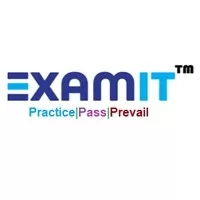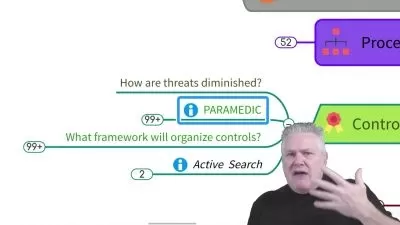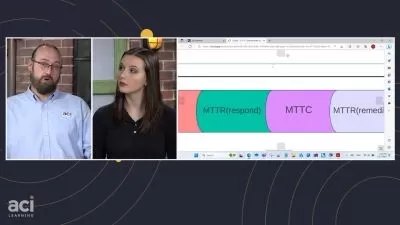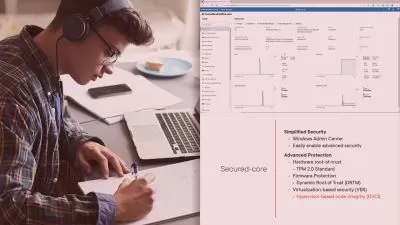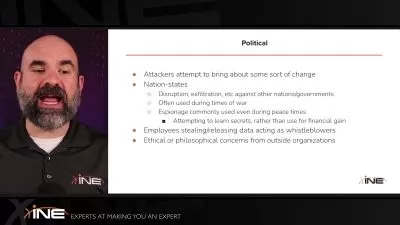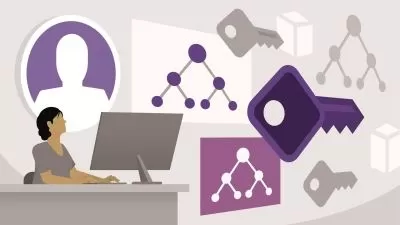CompTIA Security+ (SY0-701)- Domain 3- Security Architecture
ExamIT -Sonia
3:35:44
Description
CompTIA Security+ (SY0-701) - Domain 3 - Security Architecture
What You'll Learn?
- Apply fundamental security design principles to create secure systems and networks.
- Design and implement secure network architectures and infrastructure.
- Develop secure system and application architectures using best practices.
- Utilize security models and frameworks to guide security architecture decisions.
Who is this for?
What You Need to Know?
More details
DescriptionThis course is designed to provide students with a thorough understanding of security architecture and its role in protecting an organization's information systems. As part of the CompTIA Security+ (SY0-701) certification, Domain 3 focuses on the principles, frameworks, and components of a robust security architecture. Students will learn how to design, implement, and manage secure infrastructure and environments, ensuring the confidentiality, integrity, and availability of data.
Key Topics Covered:
Security Design Principles:
Understanding fundamental security design principles, such as defense in depth, least privilege, and separation of duties.
Applying these principles to the design and implementation of secure systems and networks.
Network Architecture and Security:
Designing secure network architectures, including segmentation, zoning, and secure topologies.
Implementing network security devices and technologies, such as firewalls, intrusion detection/prevention systems (IDS/IPS), and VPNs.
Secure System Design:
Building secure operating systems and application architectures.
Implementing secure coding practices and software development lifecycle (SDLC) principles.
Understanding virtualization and cloud security considerations.
Identity and Access Management (IAM):
Designing and implementing IAM solutions, including authentication, authorization, and accounting (AAA) mechanisms.
Utilizing multifactor authentication (MFA) and single sign-on (SSO) solutions.
Managing identity lifecycle and access controls.
Physical Security:
Understanding the importance of physical security controls to protect information assets.
Implementing physical security measures, such as access controls, surveillance, and environmental controls.
Security Models and Frameworks:
Exploring various security models, such as Bell-LaPadula, Biba, and Clark-Wilson.
Understanding and applying security frameworks and standards, such as ISO/IEC 27001, NIST, and COBIT.
Data Security and Privacy:
Implementing data protection mechanisms, including encryption, data masking, and tokenization.
Ensuring compliance with data privacy regulations and standards, such as GDPR and CCPA.
Security Testing and Assessment:
Conducting security assessments, including vulnerability scanning, penetration testing, and security audits.
Interpreting assessment results and applying corrective actions to mitigate identified risks.
Who this course is for:
- This course is ideal for IT professionals seeking to deepen their understanding of security architecture and for those preparing for the CompTIA Security+ (SY0-701) certification exam.
This course is designed to provide students with a thorough understanding of security architecture and its role in protecting an organization's information systems. As part of the CompTIA Security+ (SY0-701) certification, Domain 3 focuses on the principles, frameworks, and components of a robust security architecture. Students will learn how to design, implement, and manage secure infrastructure and environments, ensuring the confidentiality, integrity, and availability of data.
Key Topics Covered:
Security Design Principles:
Understanding fundamental security design principles, such as defense in depth, least privilege, and separation of duties.
Applying these principles to the design and implementation of secure systems and networks.
Network Architecture and Security:
Designing secure network architectures, including segmentation, zoning, and secure topologies.
Implementing network security devices and technologies, such as firewalls, intrusion detection/prevention systems (IDS/IPS), and VPNs.
Secure System Design:
Building secure operating systems and application architectures.
Implementing secure coding practices and software development lifecycle (SDLC) principles.
Understanding virtualization and cloud security considerations.
Identity and Access Management (IAM):
Designing and implementing IAM solutions, including authentication, authorization, and accounting (AAA) mechanisms.
Utilizing multifactor authentication (MFA) and single sign-on (SSO) solutions.
Managing identity lifecycle and access controls.
Physical Security:
Understanding the importance of physical security controls to protect information assets.
Implementing physical security measures, such as access controls, surveillance, and environmental controls.
Security Models and Frameworks:
Exploring various security models, such as Bell-LaPadula, Biba, and Clark-Wilson.
Understanding and applying security frameworks and standards, such as ISO/IEC 27001, NIST, and COBIT.
Data Security and Privacy:
Implementing data protection mechanisms, including encryption, data masking, and tokenization.
Ensuring compliance with data privacy regulations and standards, such as GDPR and CCPA.
Security Testing and Assessment:
Conducting security assessments, including vulnerability scanning, penetration testing, and security audits.
Interpreting assessment results and applying corrective actions to mitigate identified risks.
Who this course is for:
- This course is ideal for IT professionals seeking to deepen their understanding of security architecture and for those preparing for the CompTIA Security+ (SY0-701) certification exam.
User Reviews
Rating
ExamIT -Sonia
Instructor's Courses
Udemy
View courses Udemy- language english
- Training sessions 9
- duration 3:35:44
- Release Date 2024/08/12





